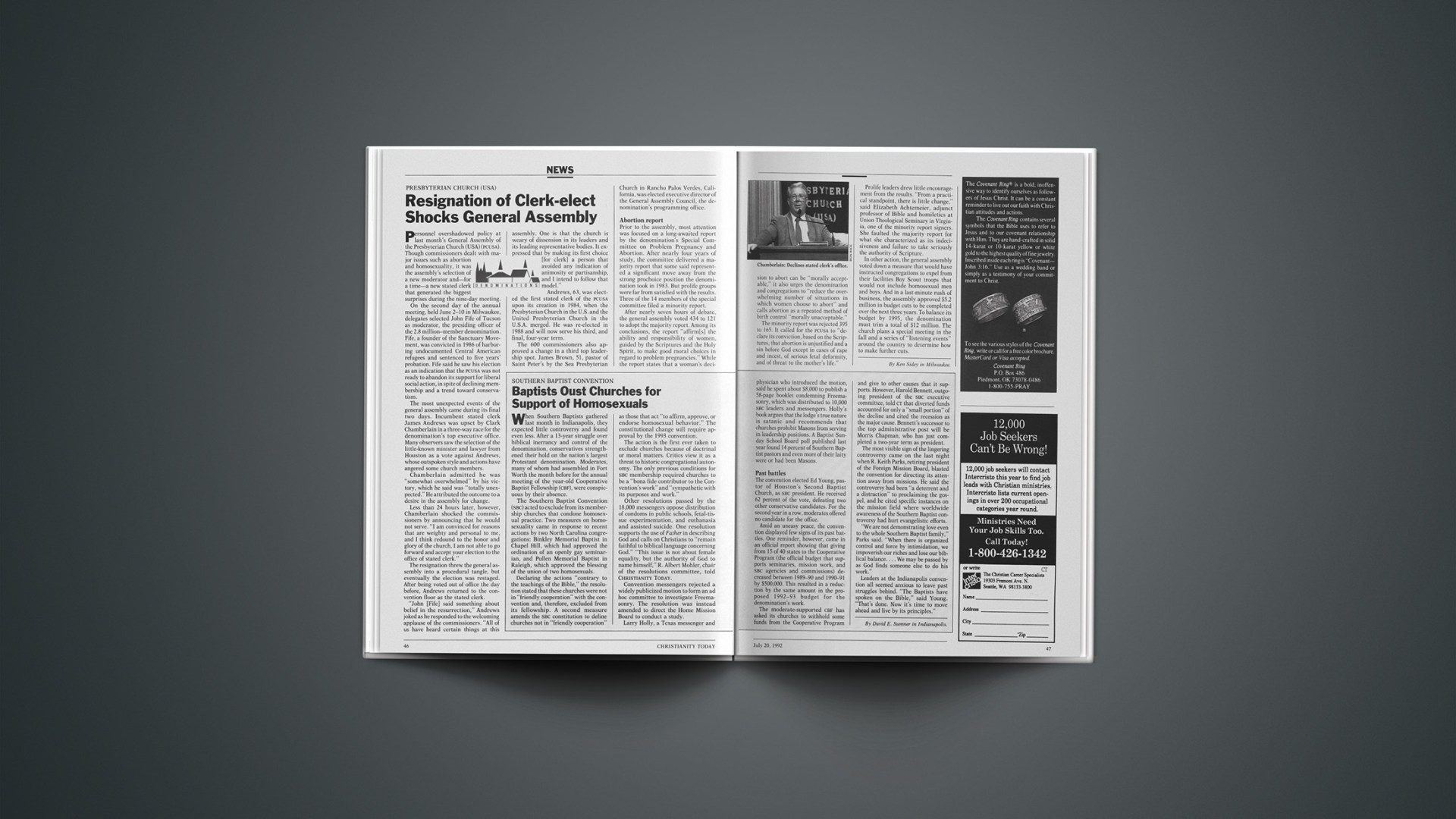When Southern Baptists gathered last month in Indianapolis, they expected little controversy and found even less. After a 13-year struggle over biblical inerrancy and control of the denomination, conservatives strengthened their hold on the nation’s largest Protestant denomination. Moderates, many of whom had assembled in Fort Worth the month before for the annual meeting of the year-old Cooperative Baptist Fellowship (CBF), were conspicuous by their absence.
The Southern Baptist Convention (SBC) acted to exclude from its membership churches that condone homosexual practice. Two measures on homosexuality came in response to recent actions by two North Carolina congregations: Binkley Memorial Baptist in Chapel Hill, which had approved the ordination of an openly gay seminarian, and Pullen Memorial Baptist in Raleigh, which approved the blessing of the union of two homosexuals.
Declaring the actions “contrary to the teachings of the Bible,” the resolution stated that these churches were not in “friendly cooperation” with the convention and, therefore, excluded from its fellowship. A second measure amends the SBC constitution to define churches not in “friendly cooperation” as those that act “to affirm, approve, or endorse homosexual behavior.” The constitutional change will require approval by the 1993 convention.
The action is the first ever taken to exclude churches because of doctrinal or moral matters. Critics view it as a threat to historic congregational autonomy. The only previous conditions for SBC membership required churches to be a “bona fide contributor to the Convention’s work” and “sympathetic with its purposes and work.”
Other resolutions passed by the 18,000 messengers oppose distribution of condoms in public schools, fetal-tissue experimentation, and euthanasia and assisted suicide. One resolution supports the use of Father in describing God and calls on Christians to “remain faithful to biblical language concerning God.” “This issue is not about female equality, but the authority of God to name himself,” R. Albert Mohler, chair of the resolutions committee, told CHRISTIANITY TODAY.
Convention messengers rejected a widely publicized motion to form an ad hoc committee to investigate Freemasonry. The resolution was instead amended to direct the Home Mission Board to conduct a study.
Larry Holly, a Texas messenger and physician who introduced the motion, said he spent about $8,000 to publish a 58-page booklet condemning Freemasonry, which was distributed to 10,000 SBC leaders and messengers. Holly’s book argues that the lodge’s true nature is satanic and recommends that churches prohibit Masons from serving in leadership positions. A Baptist Sunday School Board poll published last year found 14 percent of Southern Baptist pastors and even more of their laity were or had been Masons.
The convention elected Ed Young, pastor of Houston’s Second Baptist Church, as SBC president. He received 62 percent of the vote, defeating two other conservative candidates. For the second year in a row, moderates offered no candidate for the office.
Amid an uneasy peace, the convention displayed few signs of its past battles. One reminder, however, came in an official report showing that giving from 15 of 40 states to the Cooperative Program (the official budget that supports seminaries, mission work, and SBC agencies and commissions) decreased between 1989–90 and 1990–91 by $500,000. This resulted in a reduction by the same amount in the proposed 1992–93 budget for the denomination’s work.
The moderate-supported CBF has asked its churches to withhold some funds from the Cooperative Program and give to other causes that it supports. However, Harold Bennett, outgoing president of the SBC executive committee, told CT that diverted funds accounted for only a “small portion” of the decline and cited the recession as the major cause. Bennett’s successor to the top administrative post will be Morris Chapman, who has just completed a two-year term as president.
The most visible sign of the lingering controversy came on the last night when R. Keith Parks, retiring president of the Foreign Mission Board, blasted the convention for directing its attention away from missions. He said the controversy had been “a deterrent and a distraction” to proclaiming the gospel, and he cited specific instances on the mission field where worldwide awareness of the Southern Baptist controversy had hurt evangelistic efforts.
“We are not demonstrating love even to the whole Southern Baptist family,” Parks said. “When there is organized control and force by intimidation, we impoverish our riches and lose our biblical balance.… We may be passed by as God finds someone else to do his work.”
Leaders at the Indianapolis convention all seemed anxious to leave past struggles behind. “The Baptists have spoken on the Bible,” said Young. “That’s done. Now it’s time to move ahead and live by its principles.”
By David E. Sumner in Indianapolis.










